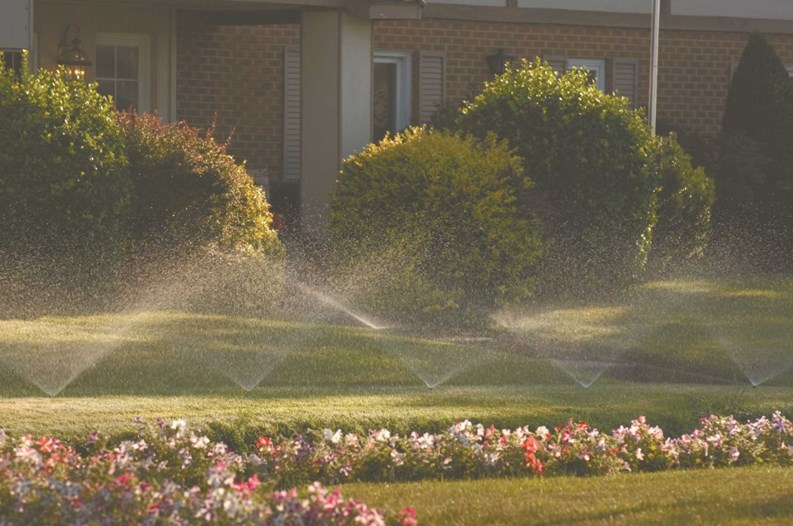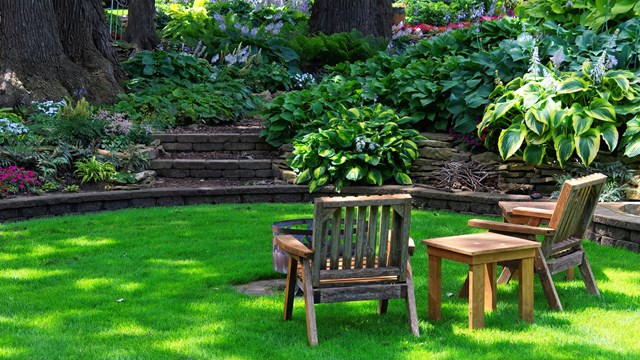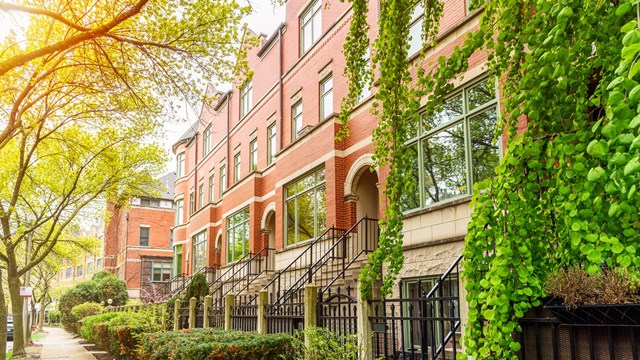One of the things that attracts people to a condo or HOA are the beautiful grounds and lush landscaping that surrounds the property. Because of the topography of the Chicagoland area, depending on where a home is located, water could be plentiful or the area could be drought-stricken. It’s almost always necessary for properties to use irrigation technology to keep their lawns, trees and shrubs healthy and green.
Anyone who has ever lived in a condo has probably seen the sprinklers go on and off, and while you may not think it’s that big of a deal, using the proper system and controlling water levels for all areas of the property can be a challenge. In the past, associations may have relied strictly on sprinkler systems or gardeners who would water the property with hoses, but irrigation systems have come a long way and today’s watering technology is cheaper, greener and much more sophisticated. Long gone are the days when installers would drop pipe haphazardly into the ground figuring that spraying around large volumes of water would make up for a hit-or-miss installation.
New and Improved
Irrigation controllers have become extremely sophisticated, going as far as adding computer technology to improve its timing and diagnostics. Unfortunately for landscapers, this doesn’t end the need to connect the controller to every valve with a bundle of dedicated buried wire.
The programmable valve is another innovation that uses no electricity and is being sampled by some area landscapers. The valve can be programmed to open and close in any combination of settings based on a cycle of every seven times the water is turned on. It is small enough to be installed under a sprinkler head, or in another version, can be used in a water line. This innovation means that each sprinkler head can be programmed to open at different times than the others in the same zone.
Materials have also changed a lot in recent years, with newer type heads designed to last longer. Spray head sprinklers are designed for more durability and uniform watering and are ideal for lawns, flowerbeds, and shrubs. Meanwhile, new plastic valves are constructed for reliability and are easy to install for a multi-valve system.
“Recent innovations in irrigation use less water more effectively,” Dennis Fiddick, the commercial account manager for DRF Total Property Solutions in Chicago, says. “MP rotary is an example of a low-flow sprinkler head that covers the same area as a lot of other types of heads, but at a much lower rate of water. So that means you can effectively cover areas using less water, and have more control over it. If you irrigate at a high rate, you lose control, and a lot of that water will just run down the road and into the storm sewer, as opposed to sinking into the ground, in the soil. So these systems are moving to a much slower rate of irrigation which allows you more control and less runoff. And that's a concept that's kind of spreading through the entire irrigation industry right now,” Fiddick says.
Water Conservation
“Last year the city of Chicago, in an effort to try to figure out how to solve their budget problems, decided to raise the price of water in a four year structured increase that will double the cost of water from 2012 to 2016,” Fiddick explains. According to Mayor Rahm Emanuel’s 2012 budget proposal, the rate of water went from $2.01 per 1,000 gallons to $2.51 per 1,000 gallons in 2012. “The 2013 rate will be $2.89; 2014 will be $3.32; and 2015 will be $3.82,” as per the city’s website at www.cityofchicago.org.
“The reason that helps solve Chicago's budget problem is because most of the suburbs use city of Chicago water. All the people that have irrigation systems are now really interested in what kind of controls they can put on their irrigation systems that will make sure they’re not over-watering.”
According to Fiddick, this water price hike has really inspired associations to employ smart water technology. “To be honest with you, this area here around the Great Lakes is probably one of the last areas to really take the water conservation thing seriously. There's such an abundance of fresh water here. With Lake Michigan sitting there, no one really sees the water issues that a lot of the other parts of the country have. They don't rely on water from wells like the other parts of the country do. They're getting the water right from Lake Michigan. So, to be honest with you, it's taken something like this price increase to wake everybody up around here and say, ‘Whoa, wait a second, am I wasting water?’ And the answer in most cases is ‘Yes.’ Fiddick says.
Plant choice is as equally important when in comes to water conservation as the logistics of the irrigations system, according to John Alexander, the field supervisor for Christy Webber Landscapes in Chicago.
“If people select plant material that is adapted to our climate, then irrigation would only be needed minimally to sustain plants during drought conditions,” Alexander says. Plants have numerous benefits to our environment through storm water management, air quality benefits, CO2 reduction and depending on their placement in the landscape they can benefit households in electric savings by providing shade.”
Irrigation by Season
An irrigation contractor will do more than just put in sprinkler heads and clocks; they will work with you throughout the year to ensure the landscaping is looking its best at all times. Fiddick says it’s important to plan all year as each season requires checks to the system. “In the Midwest, irrigation systems are seasonally operated. They usually are turned on sometime after April 1st and then they are winterized sometime between October 15th and November 15th.”
As of January 1, 2008, all irrigation systems in Illinois must be equipped with moisture or rainfall technology. “Irrigation systems need to be equipped with some sort of sensors and equipment that can read rainfall and heat, so that they self-adjust,” Fiddick says. “The system has the ability to sense what the weather is and change accordingly, raise or lower the watering times based on what the weather conditions are.”
In the spring, all drain valves and plugs are closed to look for any leaks in the system. Each individual zone is checked and all heads are cleaned and adjusted to maximize proper efficiency. Once everything is done, the system is reset for proper zone coverage and the control time is reset for optimal spring watering needs.
When the cold weather comes around, valves and drains are shut off and compressed air is pumped into the main lines, valves and heads to ensure the system is completely water free and prevents breakage of frozen pipes and valves, Fiddick says.
Licensed and Insured
Before hiring someone to fill your irrigation needs, a condo or HOA should make sure that the company is licensed and insured and has met the irrigation guidelines of Illinois, experts stress.
“When HOA’s are selecting a landscaper, they should make sure the provider understands the plant material water requirements in relation to the irrigation settings. In other words, don’t just set the irrigation to run and walk away. That’s a recipe for disaster—proper monitoring is key. The landscape provider should be able to spot signs of stress due to over-watering and under-watering,” Alexander says.
According to Chapter 111 par. 1102 of the Illinois Plumbing Licensing Law, “Every irrigation contractor must provide proof that he or she is a certified irrigation contractor or certified irrigation designer.”
“I would suggest that the first thing they do is make sure the irrigation contractor they choose is a certified irrigation contractor through the Irrigation Association,” Fiddick says. “That's a worldwide organization that has certification and education classifications. You want to make sure the contractor you're choosing has the knowledge to design the system using the appropriate equipment, and is designing an efficient irrigation system. Otherwise, your poor choice in a contractor that doesn't have this design knowledge will result in you spending way more on water costs than you should,” he warns.
To find a certified irrigation contractor near you, visit the Illinois Landscape Contractors Association at www.ilca.net or the Irrigation Association at www.irrigation.org.
No one should take their landscaping for granted and for a condo or HOA who wants to attract more people, they should really look into upgrading its irrigation system.
That way your grass is sure to be greener on your side of the fence.
Keith Loria is a freelance writer and a frequent contributor to The Chicagoland Cooperator. Editorial Assistant Enjolie Esteve contributed to this article.







Leave a Comment